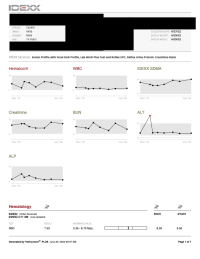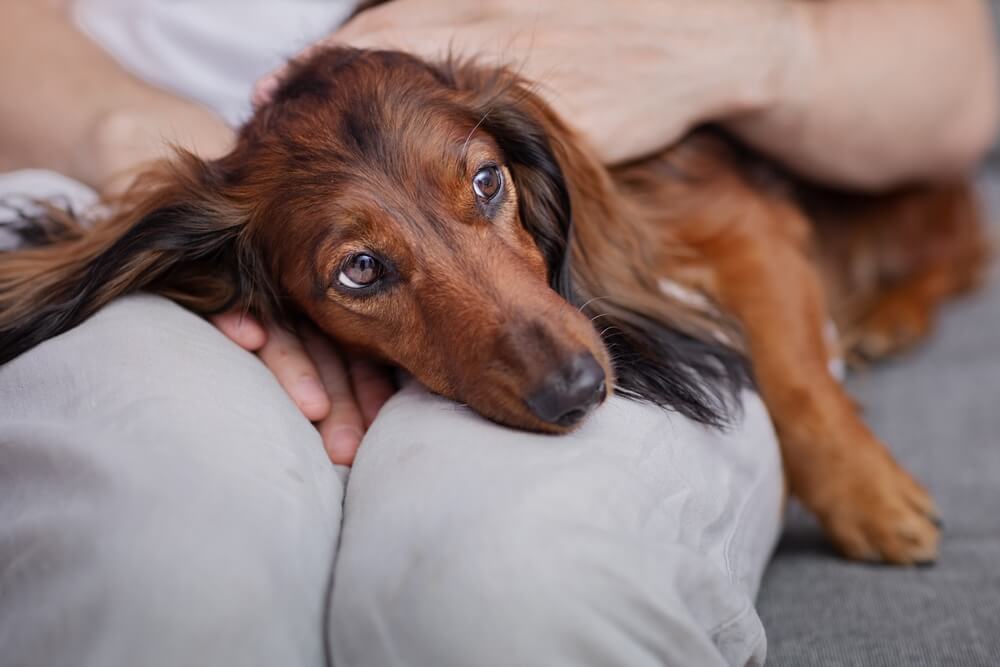Fuckyeahsugar
Member
- Joined
- Apr 7, 2014
- Messages
- 9
I have a 14 (almost 15) year old Akita, who has been very healthy. He gets bloodwork every 6 months, and his thryoid T4 trends low (this is the only thing the senior panel covers). The attached bundle of pdfs shows his trends and his latest bloodwork taken 6/28/22. MSU full thryoid panel coming.
The dilemma: He formed a very sizable mass near his thyroid over the past (suspected) 3 months. Also noticed growth on his eye that has gotten bigger.
If you do not know, his breed is highly prone to hypothryoidism; I have attached an additional pdf on this.
It should be noted, too, that goiters in dogs are extremely rare, though cysts of the thyroid have occurred and have been documented in a case of 3 boxers (also prone to hypothyroidism). See here https://bmcvetres.biomedcentral.com/articles/10.1186/s12917-019-1948-z
The image in the referenced study looks how my dog's mass feels. It is like a big hard smooth dome that moves over his trachea/my vet things the trachea is moving with it, so she suspects it is attached somewhere in the neck (thyroid or tissue on top). I actually got two opinions, one believing it could very well be some type of sarcoma on the tissue, the other believing it may be on the thyroid. However, when the aspirate was taken, the slides were not highly blood contaminated which is noted typically with thyroid tumors (very bloody).
With all this being said, I do not yet have cytology back or his FULL thyroid panel done at MSU, unfortunately, and my boy is scheduled for an ultrasound on July 12 (I have not OK'd chest xrays). He handles sedation and sedative meds extremely poorly (uh, low metabolism?) and so I do not want to put him under undue stress of this until we have more answers. His vets are on board with this. He had an extremely strong reaction to dex in 2020 (vomiting uncontrollably for 4 days) and so his primary vet proposed a slow drip of propofol for the ultrasound. Thoughts on this?
He underwent emergency bloat surgery in March 2022 this year and I am so grateful that he lived through that, as his stomach had flipped twice. But, with this in mind, they literally just saw and examined him, so would they have not felt a huge 4 inch dome mass on his neck? Maybe they didn't feel it, it's not visible due to his fur. This scares me and makes me think I might be dealing with a cancerous tumor. I have had a dog in the past who underwent a very invasive surgery as well and died from adenocarcinoma a short time later. I do not know if another surgery will be good for him, especially considering they will likely want to run CT scans for it. Now, I have heard of success stories for dogs who go this route and extends their life much longer, so honestly I am on the fence.
----
If you have read this far, all in all, I am asking for some thoughts on treating potential sarcoma or thyroid cancer in dogs so that I can be properly prepared and armed with a load of questions for my vets and a plan of attack to help him. It could very well be the cystadenoma noted in the shared study (MAN I am really hoping for this) which I assume could potentially be addressed with thyroid hormone even. In the event it is not, thoughts, ideas, shared similar experience welcome.
----
Additional information:
* DIET He was originally on the 'Inception' diet of pork, but they had supply issues so he was switched to 'Acana singles' (beef) which has a 1.3% omega-6 fatty acid min and 0.8% omega-3 fatty acid min (I look for the lowest ones). He supplements with a grass fed collagen now (recent). For some reason he does not like coconut oil! So I do not force it. He does, however, love carrots and blueberries, so he gets an afternoon carrot typically when I assume he's digested most of his food. Fed AM & PM, about 12 hours apart. So he gets a carrot or two typically at hour 6 or 7 after breakfast. He is slightly underweight since he refused food for a week after his bloat surgery and had a terrible infection treated with high dose antibiotics. He did not regain all weight back until I recently bumped it up higher.
* SUPPLEMENTS.
-- Off/on use of enteric coated aspirin (has anyone used Aniprin P with dogs? there are very negative studies about ulcers & aspirin for dogs and my vets hated the idea of me putting him on aspirin..).
-- CBD oil (ellevet), 25 drops/day (RECENT) - REALLY helps with his back pain / they suspect wearing of lower spine (NOT hips) / perhaps nerve sensitivity in lower spine. Also really really helps with anxiety when going to the vet. He is a hermit dog, not super trusting or tolerant of people he doesn't know, and it really mellows him out.
-- DEBATING Galliprant but it does NOT have the same anti-cancer effects as asprin and other NSAIDs as referenced in Peat's notably shared asprin anti-cancer study, so far as I am aware. It is an anti-prostaglandin though; but, I could likely get his vet to prescribe an aspirin alternative with similar effects that is approved for dogs (I think it was peroxicam and meloxicam - but he seemed to have a poorer UI reaction to meloxicam after his surgery (not controlled enough to say, that was insanity).. he has no reaction to the enteric coated aspirin maybe because he has not been taking it long enough or it is not getting absorbed).
ENVIRONMENT
-- We DO live near a nuclear powerplant and we are at about ground level, not much CO2 help there. Not sure if could up this for him/if it would be beneficial.
-- He is a big sleeper, very low stress environment. He is usually very goofy and carefree and I keep the house as cold as the a/c will go in the hot months, so I believe he is very comfortable considering he sleeps like a baby. I don't force him on walks esp not in the heat. I let him be lazy. He used to fear fireworks / gun shots but an ear antibiotic made him partially deaf so now he can't really hear them!
The dilemma: He formed a very sizable mass near his thyroid over the past (suspected) 3 months. Also noticed growth on his eye that has gotten bigger.
If you do not know, his breed is highly prone to hypothryoidism; I have attached an additional pdf on this.
It should be noted, too, that goiters in dogs are extremely rare, though cysts of the thyroid have occurred and have been documented in a case of 3 boxers (also prone to hypothyroidism). See here https://bmcvetres.biomedcentral.com/articles/10.1186/s12917-019-1948-z
The image in the referenced study looks how my dog's mass feels. It is like a big hard smooth dome that moves over his trachea/my vet things the trachea is moving with it, so she suspects it is attached somewhere in the neck (thyroid or tissue on top). I actually got two opinions, one believing it could very well be some type of sarcoma on the tissue, the other believing it may be on the thyroid. However, when the aspirate was taken, the slides were not highly blood contaminated which is noted typically with thyroid tumors (very bloody).
With all this being said, I do not yet have cytology back or his FULL thyroid panel done at MSU, unfortunately, and my boy is scheduled for an ultrasound on July 12 (I have not OK'd chest xrays). He handles sedation and sedative meds extremely poorly (uh, low metabolism?) and so I do not want to put him under undue stress of this until we have more answers. His vets are on board with this. He had an extremely strong reaction to dex in 2020 (vomiting uncontrollably for 4 days) and so his primary vet proposed a slow drip of propofol for the ultrasound. Thoughts on this?
He underwent emergency bloat surgery in March 2022 this year and I am so grateful that he lived through that, as his stomach had flipped twice. But, with this in mind, they literally just saw and examined him, so would they have not felt a huge 4 inch dome mass on his neck? Maybe they didn't feel it, it's not visible due to his fur. This scares me and makes me think I might be dealing with a cancerous tumor. I have had a dog in the past who underwent a very invasive surgery as well and died from adenocarcinoma a short time later. I do not know if another surgery will be good for him, especially considering they will likely want to run CT scans for it. Now, I have heard of success stories for dogs who go this route and extends their life much longer, so honestly I am on the fence.
----
If you have read this far, all in all, I am asking for some thoughts on treating potential sarcoma or thyroid cancer in dogs so that I can be properly prepared and armed with a load of questions for my vets and a plan of attack to help him. It could very well be the cystadenoma noted in the shared study (MAN I am really hoping for this) which I assume could potentially be addressed with thyroid hormone even. In the event it is not, thoughts, ideas, shared similar experience welcome.
----
Additional information:
* DIET He was originally on the 'Inception' diet of pork, but they had supply issues so he was switched to 'Acana singles' (beef) which has a 1.3% omega-6 fatty acid min and 0.8% omega-3 fatty acid min (I look for the lowest ones). He supplements with a grass fed collagen now (recent). For some reason he does not like coconut oil! So I do not force it. He does, however, love carrots and blueberries, so he gets an afternoon carrot typically when I assume he's digested most of his food. Fed AM & PM, about 12 hours apart. So he gets a carrot or two typically at hour 6 or 7 after breakfast. He is slightly underweight since he refused food for a week after his bloat surgery and had a terrible infection treated with high dose antibiotics. He did not regain all weight back until I recently bumped it up higher.
* SUPPLEMENTS.
-- Off/on use of enteric coated aspirin (has anyone used Aniprin P with dogs? there are very negative studies about ulcers & aspirin for dogs and my vets hated the idea of me putting him on aspirin..).
-- CBD oil (ellevet), 25 drops/day (RECENT) - REALLY helps with his back pain / they suspect wearing of lower spine (NOT hips) / perhaps nerve sensitivity in lower spine. Also really really helps with anxiety when going to the vet. He is a hermit dog, not super trusting or tolerant of people he doesn't know, and it really mellows him out.
-- DEBATING Galliprant but it does NOT have the same anti-cancer effects as asprin and other NSAIDs as referenced in Peat's notably shared asprin anti-cancer study, so far as I am aware. It is an anti-prostaglandin though; but, I could likely get his vet to prescribe an aspirin alternative with similar effects that is approved for dogs (I think it was peroxicam and meloxicam - but he seemed to have a poorer UI reaction to meloxicam after his surgery (not controlled enough to say, that was insanity).. he has no reaction to the enteric coated aspirin maybe because he has not been taking it long enough or it is not getting absorbed).
ENVIRONMENT
-- We DO live near a nuclear powerplant and we are at about ground level, not much CO2 help there. Not sure if could up this for him/if it would be beneficial.
-- He is a big sleeper, very low stress environment. He is usually very goofy and carefree and I keep the house as cold as the a/c will go in the hot months, so I believe he is very comfortable considering he sleeps like a baby. I don't force him on walks esp not in the heat. I let him be lazy. He used to fear fireworks / gun shots but an ear antibiotic made him partially deaf so now he can't really hear them!





